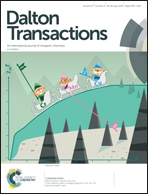NiII–LnIII complexes with o-vanillin as the main ligand: syntheses, structures, magnetic and magnetocaloric properties†
Abstract
ortho-Vanillin in the presence of nickel and lanthanide ions yields three types of heteronuclear NiII–GdIII complexes, ranging from dinuclear to tetranuclear defect dicubane complexes, as demonstrated by their structural determinations. These complexes are dependent on the solvents used during the reaction processes and on the retained lanthanide ions, as characterized by an increase in their Lewis acid character on moving from lighter to heavier lanthanide ions. Intramolecular ferromagnetic NiII–GdIII interactions are present in the heterodinuclear NiII–GdIII entities, whereas ferromagnetic NiII–NiII and NiII–GdIII interactions dominate above 2 K in the tetranuclear NiII2–GdIII2 compounds, devoid of any GdIII–GdIII interaction. The effect of a magnetic field on the magnetic entropy and adiabatic temperature changes is maximum near the liquid-helium boiling temperature, mainly determined by the relative weakness of the magnetic interactions.



 Please wait while we load your content...
Please wait while we load your content...